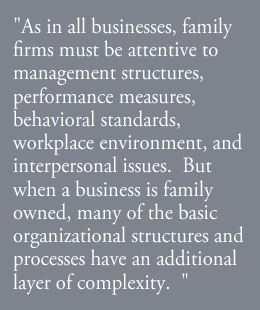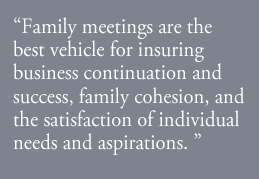

Running a successful family firm demands all the skills and acumen of normal business ownership, and more, since combining the day-to-day pressures of business with the intricacies of family relationships can lead to unique challenges.
 As in all businesses, family firms must be attentive to management structures, performance measures, behavioral standards, workplace environment, and interpersonal issues. But when a business is family owned, many of the basic organizational structures and processes have an additional layer of complexity. Management structures are often shared by parents and children, by siblings, or between family and non-family members. The rights of inheritance vs. merit may complicate employee compensation and reward systems. Interpersonal issues are usually multifaceted, less likely to be effectively dealt with, and more stressful to live with.
As in all businesses, family firms must be attentive to management structures, performance measures, behavioral standards, workplace environment, and interpersonal issues. But when a business is family owned, many of the basic organizational structures and processes have an additional layer of complexity. Management structures are often shared by parents and children, by siblings, or between family and non-family members. The rights of inheritance vs. merit may complicate employee compensation and reward systems. Interpersonal issues are usually multifaceted, less likely to be effectively dealt with, and more stressful to live with.
Although many family owners recognize the wisdom of separating family matters from business management, decision-making about business transitions often becomes highly emotionally charged. Keeping the peace in the family sometimes wins out over making the best decisions for the business, even in the face of loss of potential revenue. In fact, the stresses on family businesses are such that fewer than 1 in 3 family firms survive into the second generation, and fewer than 1 in 10 to the third.
![]()
Finding the right balance between family ownership and executive leadership. Every family business owner has to decide: Are ownership and employment opportunities in the company birthrights, or are they earned? Does being a family member automatically ensure a seat on the executive management team? Is it awkward to have non-family in management positions? If the line between performance and inheritance is unclear, the message sent to children and staff members can be confusing and/or demoralizing.
 Communicating about the future. Often, founding owners and their children do not communicate directly and candidly about the younger generation's future in the company. Instead, both may hold untested assumptions. Children may assume that they will inherit ownership and leadership of the company, without actually knowing the parent's plan. Parents may expect children to take their place after retirement, without having communicated this to their heirs.
Communicating about the future. Often, founding owners and their children do not communicate directly and candidly about the younger generation's future in the company. Instead, both may hold untested assumptions. Children may assume that they will inherit ownership and leadership of the company, without actually knowing the parent's plan. Parents may expect children to take their place after retirement, without having communicated this to their heirs.
Planning for succession. Transfer of leadership in a family firm is an anxiety-provoking, though critical, rite of passage for both the business and the family. Preparation for succession is often avoided, even to the detriment of the business. (For more about this subject, read our article, "The Changing of the Guard in the Family Business").
Determining the most effective ownership/management model. Since the original model for family businesses is often that of a single controlling founder/ owner, it can be challenging to envision and transition to a different model, such as sibling partnerships or parent-child partnerships.
Developing a shared vision. Family members often have different perspectives about the future of the company. They may vary widely in their degree of dedication to the company's growth and their commitment to work/life balance, as expressed in the number of hours each wants to spend in the workplace. If individual views are not expressed or discussed, these differences can result in lack of clear direction for the company and to interpersonal friction.
![]()
In our work with family businesses to address these and other issues, we incorporate many of the principles and processes used in all our coaching and organizational efforts. Our coaches have honed their leadership and organizational development skills consulting to CEO's, executives, and entrepreneurs in small, mid-size, and large corporations. In addition, our coaches have the benefit of extensive psychological training and practice with systems theory, family dynamics, conflict resolution, and family communication. They are well trained in the specific business and interpersonal challenges as well as forms of governance for family businesses, such as the family council, shareholders assembly, etc.
Each family business project is as unique as the business itself. Some businesses may require simply having a key figure (CEO, second generation executive, non-family manager) participate in an executive coaching program to develop the leadership skills required for success in the firm. Sometimes, a partnership-building program between two or more parties in conflict is necessary. In other cases, we are asked to conduct an organizational assessment to identify issues in the family/business interaction that may impede the company's productivity or growth. Based on the data collected in the review of the business, we work with the client to develop a plan of action that will address and remedy those matters.
![]()
 A common intervention in a family business is a well-planned family meeting, or series of meetings, that provide a forum for family members to openly discuss important subjects in a productive fashion. Family meetings are the best vehicle for insuring business continuation and success, family cohesion, and the satisfaction of individual needs and aspirations. We prepare for these forums by meeting individually with each member to learn about the needs of the business and the perspective of each family member. We plan a suitable agenda and facilitate the discussions with an eye towards arriving at actionable outcomes. Of course, the effectiveness of family meetings is based on the willingness of participants to articulate their opinions and feelings clearly and honestly, in ways that are also productive.
A common intervention in a family business is a well-planned family meeting, or series of meetings, that provide a forum for family members to openly discuss important subjects in a productive fashion. Family meetings are the best vehicle for insuring business continuation and success, family cohesion, and the satisfaction of individual needs and aspirations. We prepare for these forums by meeting individually with each member to learn about the needs of the business and the perspective of each family member. We plan a suitable agenda and facilitate the discussions with an eye towards arriving at actionable outcomes. Of course, the effectiveness of family meetings is based on the willingness of participants to articulate their opinions and feelings clearly and honestly, in ways that are also productive.
![]()
Services we provide to family businesses include:
- Developing family or non-family business leaders through executive coaching
- Building effective leadership teams
- Assessing family issues for their impact on the business
- Assessing business issues for their impact on the family
- Helping with the creation of a shared vision and the development of goals and strategy to realize the vision
- Facilitating family/business forums to encourage open discussion on topics such as succession and family values
- Partnership building/ Conflict management - establishing processes for conflict resolution and healthy collaboration
- Succession planning; supporting leadership transitions
- Creating accountability standards; clarifying roles and responsibilities
- Facilitating the creation of a Board of Directors or Advisors
Download a printable PDF of this page.
Back to top